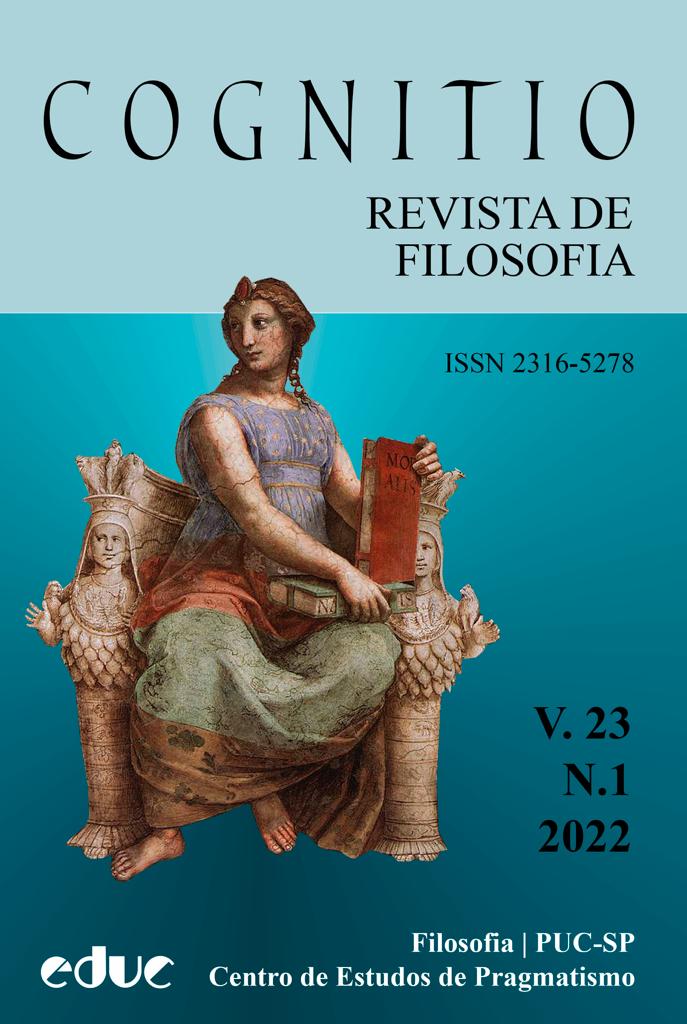Among people
on the possibility of an epistemology of conversation
DOI:
https://doi.org/10.23925/2316-5278.2022v23i1:e58222Abstract
This paper discusses that an Epistemology of Conversation should be understood as a field of Social Epistemology that is devoted to investigating the strictly epistemic norms that govern the interaction between two or more people about their beliefs and other epistemic states. An elementary definition of conversation is: a cooperative communicative act in which participants assume common purposes and commit themselves to contribute relevant statements (assertions). Starting from this elementary definition, I present four issues that should be considered by an Epistemology of Conversation: a) that disagreement is a relevant motivation for conversation; b) that conversation is a means or method of inquiry in cases of disagreement between peers; c) that the expected virtues of participants are epistemic virtues; and d) that any outcome of a conversation will realize an epistemic good.
References
BRONCANO-BERROCAL, Fernando; CARTER, J. Adam. (eds.). The epistemology of group disagreement. New York; London: Routledge, 2021.
CHRISTENSEN, David; LACKEY, Jennifer. The epistemology of disagreement. New York: Oxford University Press, 2013.
COADY, C. A. J. Testimony: A philosophical study. New York: Oxford University Press, 1994.
COLLINS, Stephanie. Group duties: their existence and their implications for individuals. Oxford: Oxford University Press, 2019.
CRAIG, Edward. Knowledge and the state of nature: an essay in conceptual synthesis. Oxford: Oxford University Press, 1990.
EDENBERG, Elizabeth; HANNON, Michael. (eds.). Political epistemology. Oxford: Oxford University Press, 2021.
FELDMAN, Richard; WARFIELD, Ted. Disagreement. New York: Oxford University Press, 2010.
FRANCES, Bryan. Disagreement. Cambridge: Polity, 2014.
FRICKER, Miranda. Epistemic injustice: power and the ethics of knowing. Oxford: Oxford University Press, 2006.
GOLDBERG, Sanford C. Assertion: on the philosophical significance of assertoric speech. Oxford: Oxford University Press, 2010.
GOLDBERG, Sanford. C. Conversational pressure. Oxford: Oxford University Press, 2020.
GOLDMAN, Alvin I.; WHITCOMB, Dennis (eds). Social epistemology: essential readings. New York: Oxford University Press, 2011.
GRICE, H. Paul. Studies in the way of words. Cambridge, MA: Harvard University Press, 1989.
HAMPSHIRE, Stuart. Freedom of the individual. London: Chatto & Windus, 1965.
HANNON, Michael; RIDDER, Jeroen de. The Routdlege Handbook of Political Epistemology. New York; London: Routledge, 2021.
HOOKWAY, Christopher. How to be a virtue epistemologist. In: DEPAUL, M.; ZAGZEBSKI, L. (ed.). Intellectual virtue: perspectives from ethics and epistemology. Oxford: Oxford University Press, 2003. p. 183-202.
JOHNSON, Cassey R. (ed.). Voicing dissent: the ethics and epistemology of making disagreement public. New York, London: Routledge, 2018.
LACKEY, Jennifer. Learning from words: testimony as a source of knowledge. Oxford: Oxford University Press, 2008.
LACKEY, Jennifer; SOSA, Ernest (eds.). The epistemology of testimony. Oxford: Oxford University Press, 2006.
LAKEY, Jennifer. The epistemology of groups. Oxford: Oxford University Press, 2021.
MCKINNON, Rachel. The norms of assertion: truth, lies, and warrant. London: Palgrave Macmillan, 2015.
MORAN, Richard. Authority and estrangement: an essay on self-knowledge. Princeton, Oxford: Princeton University Press, 2001.
MORAN, Richard. The exchange of words: speech, testimony, and intersubjectivity. Oxford: Oxford University Press, 2018.
SEARLE, John. Expression and meaning. Cambridge: Cambridge University Press, 1979.
SPERBER, Dan; WILSON, Deirdre. Relevance: communication and cognition. Second Edition. Oxford, Cambridge, MA: Blackwell, 1995.
TANESINI, Alessandra. The mismeasure of the self: a study in vice epistemology. Oxford: Oxford University Press, 2021.
TANESINI, Alessandra; LYNCH, Michael P. (eds.). Polarisation, arrogance, and dogmatism: philosophical perspectives. New York, London: Routledge, 2021.
WELBOURNE, Michael. The Community of Knowledge. Philosophical Quarterly, [s. l.], v. 31, n. 125, p. 302-314, 1981. DOI: https://doi.org/10.2307/2219401.
Downloads
Published
How to Cite
Issue
Section
License
Copyright (c) 2022 http://creativecommons.org/licenses/by/4.0/

This work is licensed under a Creative Commons Attribution 4.0 International License.









